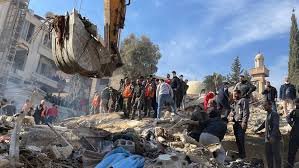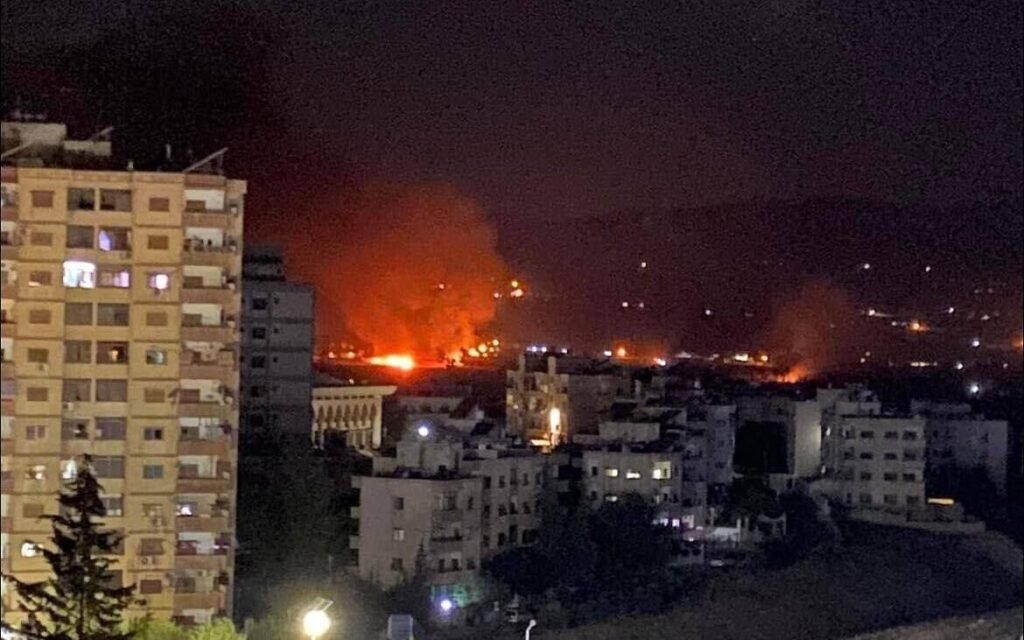An Israeli attack on Syria’s northern province of Aleppo happened overnight, leading to several deaths and causing significant damage. This attack is part of the ongoing conflict between Israel and Iran-backed forces in Syria. The strike targeted areas around Aleppo city and involved launching missiles from a position southeast of Aleppo. The Syrian government, through its state news agency Sana, confirmed the attack, mentioning that it led to several martyrs and caused some material damage.
Details of the Israeli Attack on Syria’s Aleppo
- Timing and Location:
- The attack occurred shortly after midnight.
- Missiles were fired from a position southeast of Aleppo.
- The specific target was the town of Hayyan, north of Aleppo city.
- Casualties and Damage:
- According to the Syrian Observatory for Human Rights, at least 16 people were killed.
- The dead included fighters from pro-Iranian groups, both Syrian and foreign nationals.
- A factory in Hayyan, controlled by pro-Iranian groups, was heavily damaged, causing strong explosions.

Israel’s Stance
Israel has a history of carrying out strikes inside Syria since the start of the Syrian civil war in 2011. These strikes are usually aimed at preventing Iran from expanding its influence and military presence in Syria. Israel rarely comments on these attacks but has made it clear that it will not tolerate Iranian entrenchment in the region.
Iran-Backed Forces in Syria
Iran supports several militia groups in Syria, including Lebanese Hezbollah and other Shia factions. These groups often assist the Syrian government forces in their fight against rebel groups. The presence of these Iran-backed militias near Israel’s border is a major security concern for Israel, leading to frequent airstrikes.
Recent Developments
- Increased Strikes Since October 2023:
- The frequency of Israeli strikes has increased following the outbreak of war between Israel and Hamas, an Iran-backed Palestinian militant group, in October 2023.
- This conflict began when Hamas launched a massive attack on Israel, killing around 1,200 people, mostly civilians. Israel responded with a military offensive against Hamas in Gaza.
- Since then, Hezbollah, another Iran-backed group, has been exchanging fire with the Israeli army along the Israel-Lebanon border.
- Previous Strikes:
- In May 2023, an Israeli strike in Syria’s capital Damascus targeted Hezbollah and other Shia proxy groups.
- In April 2023, Israel responded to Iranian drones and missiles by launching attacks on Iranian allies in Syria.
Impact on the Region
The conflict between Israel and Iran-backed forces in Syria is part of a larger geopolitical struggle in the Middle East. The Syrian civil war has created a complex battlefield with multiple factions, including Syrian government forces, various rebel groups, ISIS, Kurdish forces, and international players like Russia, the United States, and Iran.
Humanitarian Impact
The Syrian civil war has been devastating, with over half a million people killed and millions displaced since it began in 2011. The continuous airstrikes and military operations have worsened the humanitarian crisis, leading to severe shortages of food, medicine, and other essential supplies.
The Role of the Syrian Observatory for Human Rights
The Syrian Observatory for Human Rights (SOHR), a UK-based war monitor, plays a crucial role in documenting the casualties and damage caused by the conflict. It relies on a network of sources inside Syria and has been reporting on the losses of various factions, including those caused by Israeli strikes. However, SOHR has been accused of inflating regime losses, though it remains one of the most cited sources for information on the Syrian conflict.
The Syrian Government’s Position
The Syrian government, led by President Bashar al-Assad, has been fighting to retain control over the country since the civil war broke out. With the support of Iran and Russia, the Assad regime has managed to regain significant territory from rebel forces. However, the presence of foreign troops and militias, including those backed by Iran, complicates the situation. The Syrian government condemns Israeli airstrikes, viewing them as violations of its sovereignty.

International Reactions
- United Nations:
- The UN has repeatedly called for an end to the violence and for all parties to respect international law. The frequent airstrikes and military operations in Syria have been condemned by various UN bodies, which emphasize the need for a political solution to the conflict.
- United States:
- The US, a key ally of Israel, supports Israel’s right to defend itself against Iranian threats. However, the US also calls for restraint to avoid further escalation in the region.
- Russia:
- Russia, a major ally of the Syrian government, has a significant military presence in Syria. It often criticizes Israeli airstrikes, calling for respect for Syria’s sovereignty. However, Russia also coordinates with Israel to avoid direct conflict between their forces in Syria.
Future Prospects
The conflict in Syria shows no signs of abating in the near future. The presence of multiple foreign powers and their proxy forces makes the situation highly volatile. The Israeli-Iranian rivalry is likely to continue to play out on Syrian soil, with further airstrikes and military operations expected.
Potential Scenarios
- Escalation:
- There is a risk of further escalation between Israel and Iran-backed forces, especially if there are more attacks from groups like Hezbollah or Hamas. This could lead to a wider regional conflict involving more countries.
- Diplomatic Solutions:
- Efforts for a diplomatic solution continue, with various international actors pushing for peace talks. However, the deep-seated animosities and strategic interests of the involved parties make a comprehensive peace deal challenging.
- Humanitarian Aid:
- Increasing humanitarian aid and support for displaced Syrians is critical. International organizations continue to work in the region, but access remains difficult due to the ongoing conflict.
The Israeli attack on Aleppo is part of a broader conflict involving multiple actors in the Syrian war. It highlights the ongoing tensions between Israel and Iran-backed forces in the region. The humanitarian impact of the conflict remains severe, with millions affected by the violence. As the situation evolves, the international community continues to call for restraint and a political solution to end the suffering in Syria.
